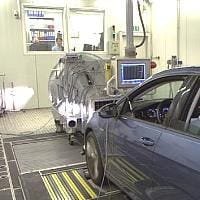(BRUSSELS) – The EU Commission took legal action to improve air quality in Europe Thursday, stepping up its enforcement against 7 EU Member States for breaching EU rules on air pollution limits and type approval for cars.
A Communication entitled ‘A Europe that protects: Clean air for all’ outlines measures available to help Member States fight air pollution. The Commission is also to engage in new ‘Clean Air Dialogues’, and will use EU funding to support measures to improve air quality.
In addition, the Commission today referred France, Germany, Hungary, Italy, Romania and the United Kingdom to the EU’s top court for failing to respect agreed air quality limit values and for failing to take appropriate measures to keep exceedance periods as short as possible. It also issued additional letters of formal notice to Germany, Italy, Luxembourg, and the United Kingdom on the grounds that they have disregarded EU vehicle type approval rules.
6 EU Member States are being referred to Court because of ‘significant and persistent exceedances of limit values for two key pollutants with health impacts’: nitrogen dioxide, mostly a result of road traffic and industry, and particulate matter, present mainly in emissions from industry, domestic heating, traffic, and agriculture.
The EU executive is referring France, Germany, and the UK for failure to respect limit values for nitrogen dioxide (NO2), and for failing to take appropriate measures to keep exceedance periods as short as possible. Hungary, Italy, and Romania are referred to the Court of Justice over persistently high levels of particulate matter (PM10). The limits set out under EU legislation on ambient air quality (Directive 2008/50/EC) had to be met in 2010 and 2005 respectively.
The Commission says the 6 states did not present ‘credible, effective and timely measures to reduce pollution, within the agreed limits and as soon as possible, as required under EU law’.
Measures being put in place or planned by the Czech Republic, Slovakia, and Spain ‘appear to be able to appropriately tackle the identified gaps, if correctly implemented’, says the EC. It will monitor implementation of these measures and their effectiveness.
For 4 Member States, the Commission is taking further steps in its infringement procedures on the grounds that they have disregarded EU vehicle type approval rules. The Commission is issuing additional letters of formal notice to Germany, Italy, Luxembourg, and the United Kingdom.
EU type-approval legislation requires Member States to have ‘effective, proportionate and dissuasive penalty systems’ in place to deter car manufacturers from breaking the law. Where such a breach of law takes place, for example by using defeat devices to reduce the effectiveness of emission control systems, remedial measures such as recalls must be ordered and penalties must be applied (Articles 30 and 46 of Directive 2007/46 and Article 13 of Regulation 715/2007).
The Commission opened infringement proceedings against Germany, Luxembourg and the United Kingdom in December 2016 with regard to Volkswagen Group and sent complementary letters of formal notice in July 2017 requesting further clarifications.
The EU executive is sending additional letters of formal notice to request more information on the national investigations and legal proceedings related to these infringements. In addition, following the discovery of new cases of engine-management irregularities in several diesel cars (Porsche Cayenne, Volkswagen Touareg and several Audi A6 and A7 vehicles) the Commission asks Germany and Luxembourg, as the competent type-approval authorities, which remedial measures and penalties are envisaged. The Commission is also requesting clarifications from the United Kingdom on planned national legislation.
In May 2017, the Commission launched an infringement procedure against Italy for failure to fulfil its obligations under the EU vehicle type-approval legislation with regards to Fiat Chrysler cars. In the meantime, Italy took corrective measures by ordering the Fiat Chrysler Automobiles group to conduct a mandatory recall in the EU. Today, as part of the ongoing exchange, the Commission requests additional information on the concrete corrective measures taken and penalties applied.
An additional letter of formal notice constitutes an official request for information. The Member States now have two months to respond to the arguments put forward by the Commission; otherwise, the Commission may decide to send a reasoned opinion.
The measures to fight air pollution proposed by the Commission focus on air quality standards, national emission reduction targets and emission standards for key sources of pollution, for example from vehicle and ship emissions to energy and industry.
To address air pollutant emissions from traffic, the Commission will further strengthen its work with national, regional and local authorities on a common integrated approach for urban vehicle access regulations, under the EU Urban Agenda.
Additional reforms are aimed at ensuring that air pollutant emissions from vehicles are measured in real driving conditions.
Communication ‘A Europe that protects: Clean air for all’
EU actions to curb vehicle pollution – Overall memo
Reform of type-approval framework (see FAQs)
Emissions testing (see FAQs)


